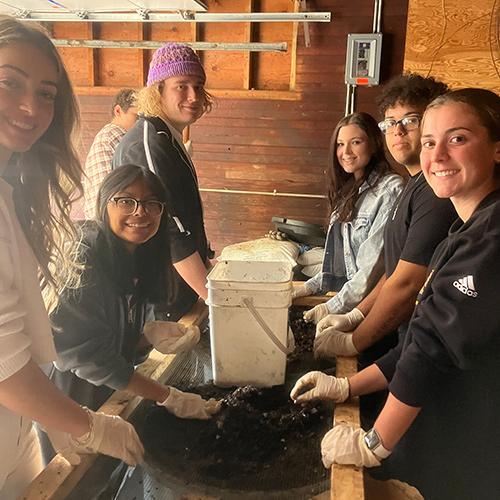Assessment of Learning Outcomes
Social Work undergraduate social work program
Assessment Data Collected During Academic Year 2022-2023
All Council on Social Work Education programs measure and report student learning outcomes. Students are assessed on their mastery of the competencies that comprise accreditation standards of the Council on Social Work Education. These competencies are dimensions of social work practice that all social workers are expected to master during their professional training. A measurement benchmark set by the social work programs for each competency. An assessment score at or above that benchmark is considered by the program to represent mastery of that particular competency.
Summary of the Program’s Assessment Plan | Generalist Practice
| Dimension(s) assessed: | Knowledge, Values, Skills, Cognitive & Affective Processes |
|---|---|
| When/where students are assessed: | Spring Semester Senior Year – Field Site |
| Who assessed student competence: | Field Instructor |
| Outcome Measure Benchmark (minimum score indicative of achievement) for Competencies 1-9: | 3 out of 5 |
| Competency Benchmark (percent of students the program expects to have achieved the minimum scores, inclusive of all measures) for Competencies 1-9: | 80% |
| Dimension(s) assessed: | Knowledge, Values, Skills, Cognitive & Affective Processes |
|---|---|
| When/where students are assessed: | Spring Semester Senior Year - Senior Capstone Conference |
| Who assessed student competence: | 2 Social Work Faculty Members |
| Outcome Measure Benchmark (minimum score indicative of achievement) for Competencies 1-9: | 3 out of 5 |
| Competency Benchmark (percent of students the program expects to have achieved the minimum scores, inclusive of all measures) for Competencies 1-9: | 80% |
| Competency | Competency Benchmark (%) | Percentage of Students Achieving Benchmark* |
|---|---|---|
| Competency 1: Demonstrate Ethical Professional Behavior |
80% of students will demonstrate competence inclusive of 2 or more measures |
100% |
| Competency 2: Engage Diversity & Difference in Practice |
80% of students will demonstrate competence inclusive of 2 or more measures |
95.4% |
| Competency 3: Advance Human Rights & Social, Economic, & Environmental Justice |
80% of students will demonstrate competence inclusive of 2 or more measures |
90.4% |
| Competency 4: Engage In Practice-informed Research & Research-informed Practice |
80% of students will demonstrate competence inclusive of 2 or more measures |
80.7% |
| Competency 5: Engage in Policy Practice |
80% of students will demonstrate competence inclusive of 2 or more measures |
89.8% |
| Competency 6: Engage with Individuals, Families, Groups, Organizations, & Communities |
80% of students will demonstrate competence inclusive of 2 or more measures |
91.7% |
| Competency 7: Assess Individuals, Families, Groups, Organizations, & Communities |
80% of students will demonstrate competence inclusive of 2 or more measures |
93.7% |
| Competency 8: Intervene with Individuals, Families, Groups, Organizations, & Communities |
80% of students will demonstrate competence inclusive of 2 or more measures |
88.9% |
| Competency 9: Evaluate Practice with Individuals, Families, Groups, Organizations, & Communities |
80% of students will demonstrate competence inclusive of 2 or more measures |
91.5% |
*Aggregated data for graduating class 2023 (N =12)
CSWE Form AS4(B)


